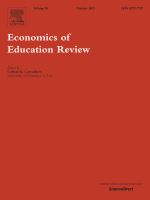ECONOMICS OF EDUCATION REVIEW
Publicado:
Clasificación JEL:
I24, R12, I21

Lo más reciente
Bernardo Romero-Torres, Gerson Javier Pérez-Valbuena, Andrés Felipe García-Suaza, Jaime Alfredo Bonet-Moron
Olga Lucia Acosta Navarro, Andrés Felipe Chitán-Caes, Ana María Iregui-Bohórquez, Ligia Alba Melo-Becerra, María Teresa Ramírez-Giraldo, Jorge Leonardo Rodríguez Arenas
Alejandro Ome, Laura Giles Álvarez, Gerson Javier Pérez-Valbuena, Cristhian Larrahondo
Rural schools are usually behind in terms of learning, and this could be partly related to geographical isolation. We explore this hypothesis, assessing the causal effect of the distance between schools, towns, and State capitals on elementary school test scores. We use granular administrative records from Colombia and estimate spatial regression discontinuity models. Results indicate that the distance to both towns and State capitals negatively affect students test scores. The differences in educational inputs, such as teachers education attainment and contract stability, partly explain these gaps. A program providing monetary incentives to teachers in difficult access areas fails to attenuate the isolation effect.
